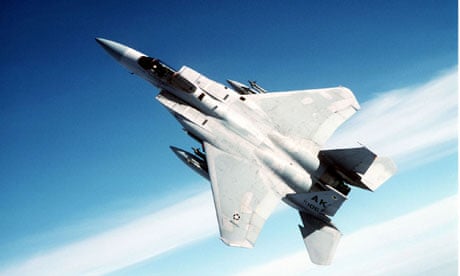Barack Obama is to go ahead with plans to sell Saudi Arabia advanced aircraft and other weapons worth up to $60bn (£39bn), the biggest arms deal in US history, in a strategy of shoring up Gulf Arab allies to face any military threat from Iran.
According to the Wall Street Journal, the administration is also in talks with the Saudis about possible naval and missile-defence upgrades that could be worth tens of billions of dollars more over five to 10 years.
Plans to go ahead with the package, which has been under secret negotiation since 2007, have been known for some time and have raised angry objections from Iran and to a lesser extent from Israel, an even closer US ally which is anxious to maintain its strategic edge over any potential adversary in the Middle East.
In its notification to Congress, the administration will authorise the Saudis to buy as many as 84 new F-15 fighters, upgrade 70 more, and purchase three different types of helicopters – 70 Apaches, 72 Black Hawks and 36 Little Birds, the Wall Street Journal reported. The package would be subject to a review by Congress.
According to earlier reports, the administration has already decided out of deference to the Israelis not to sell Saudi Arabia so-called stand-off systems, advanced long-range weapons that can be attached to F-15s for use in offensive operations.
The US is the world's largest arms supplier and the Saudi deal alone is said to support up to 75,000 jobs, according to firms such as Boeing, Northrop Grumman, Lockheed Martin and General Electric. Last year, despite a recession that hit global arms sales, the US increased its share to more than two-thirds of all foreign armaments deals, according to a congressional study.
In 2008, Saudi Arabia was the second biggest arms buyer in the developing world, spending $8.7bn, making it second only to the United Arab Emirates. Britain and France are also in intense competition to sell in this market.
US-Saudi ties suffered a serious dip after the 9/11 terrorist attacks exposed al-Qaida's Saudi background to ordinary Americans, but the military relationship is in good order. Analysts say the deal will significantly boost Saudi Arabia's ability to defend its airspace against aircraft and missiles, to undertake "very painful" deterrent strikes and to police coastal areas.
It will also lock Riyadh into a close military relationship with Washington for at least another 20 years. Questions about democracy, freedoms and human rights in the kingdom clearly have a lower priority than security issues.
The package is expected to win congressional approval with limited amendments, although probably not until after the 2 November mid-term elections. It is a striking reflection of a convergence between the strategic concerns of the US, Israel and conservative Arab states about Iran's nuclear ambitions and bid for regional influence.
Saudi Arabia has denied recent reports that it has secretly agreed to allow Israeli planes to pass through its airspace on the way to bomb nuclear sites in Iran.
Original Article
Source: theguardian.com/
Author: Ian Black
According to the Wall Street Journal, the administration is also in talks with the Saudis about possible naval and missile-defence upgrades that could be worth tens of billions of dollars more over five to 10 years.
Plans to go ahead with the package, which has been under secret negotiation since 2007, have been known for some time and have raised angry objections from Iran and to a lesser extent from Israel, an even closer US ally which is anxious to maintain its strategic edge over any potential adversary in the Middle East.
In its notification to Congress, the administration will authorise the Saudis to buy as many as 84 new F-15 fighters, upgrade 70 more, and purchase three different types of helicopters – 70 Apaches, 72 Black Hawks and 36 Little Birds, the Wall Street Journal reported. The package would be subject to a review by Congress.
According to earlier reports, the administration has already decided out of deference to the Israelis not to sell Saudi Arabia so-called stand-off systems, advanced long-range weapons that can be attached to F-15s for use in offensive operations.
The US is the world's largest arms supplier and the Saudi deal alone is said to support up to 75,000 jobs, according to firms such as Boeing, Northrop Grumman, Lockheed Martin and General Electric. Last year, despite a recession that hit global arms sales, the US increased its share to more than two-thirds of all foreign armaments deals, according to a congressional study.
In 2008, Saudi Arabia was the second biggest arms buyer in the developing world, spending $8.7bn, making it second only to the United Arab Emirates. Britain and France are also in intense competition to sell in this market.
US-Saudi ties suffered a serious dip after the 9/11 terrorist attacks exposed al-Qaida's Saudi background to ordinary Americans, but the military relationship is in good order. Analysts say the deal will significantly boost Saudi Arabia's ability to defend its airspace against aircraft and missiles, to undertake "very painful" deterrent strikes and to police coastal areas.
It will also lock Riyadh into a close military relationship with Washington for at least another 20 years. Questions about democracy, freedoms and human rights in the kingdom clearly have a lower priority than security issues.
The package is expected to win congressional approval with limited amendments, although probably not until after the 2 November mid-term elections. It is a striking reflection of a convergence between the strategic concerns of the US, Israel and conservative Arab states about Iran's nuclear ambitions and bid for regional influence.
Saudi Arabia has denied recent reports that it has secretly agreed to allow Israeli planes to pass through its airspace on the way to bomb nuclear sites in Iran.
Original Article
Source: theguardian.com/
Author: Ian Black

No comments:
Post a Comment